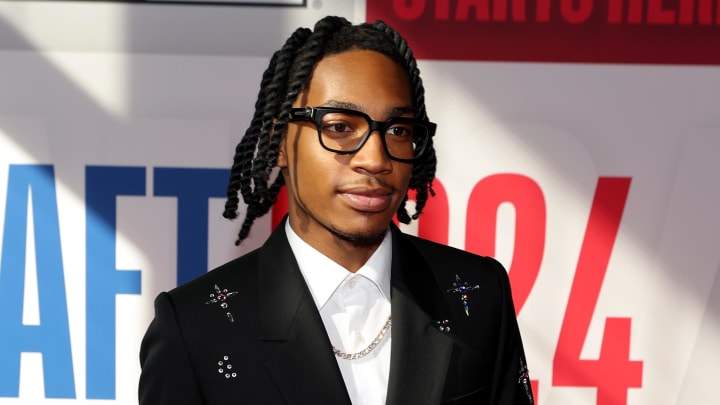2024 NBA Draft Winners and Losers: Rob Dillingham’s Perfect Fit, Pistons Gamble on Shooting

Who were the biggest winners and losers from the two-day NBA draft this week? It was a chaotic and unpredictable two days that featured a historic moment with Bronny James getting drafted, multiple big trades and several draft-day surprises. The draft’s lack of true star power at the top created uncertainty that trickled throughout the entire draft.
Which teams should be happiest with their draft hauls? And who might be kicking themselves in a few years? Here’s a look at the best and worst draft classes of 2024.
Winners
Minnesota Timberwolves
The Timberwolves pulled off one of the biggest surprises of the first round, moving into the top 10 to select shifty guard Rob Dillingham out of Kentucky. It’s a daring move with some risk involved given the future draft capital required to make the move, but the fit between Dillingham and Minnesota is outstanding. His defensive woes can get covered by the Timberwolves’ elite rim protection, and offensively Dillingham can take pressure off Anthony Edwards in the backcourt.
Further down the board, Minnesota also did well to add a pro-ready wing in Terrence Shannon Jr. at No. 27. Shannon’s athleticism fits into the Timberwolves’ defensive scheme extremely well.
Utah Jazz
Utah is in talent-amassing mode, and Danny Ainge and the Jazz front office should be thrilled with how the board broke for them. Ron Holland’s jump to No. 5 in Detroit opened the door for former five-star wing Cody Williams to drop to No. 10 for the first Jazz pick, and Williams possesses one of the highest ceilings of anyone in this draft. They then followed it up with a pair of draft-day fallers in Isaiah Collier at No. 29 and Kyle Filipowski at No. 32, both outstanding values for each slot. Collier, in particular, was a huge win that late in the draft given his recruiting pedigree and ability to play in ball screens.
For an organization that will never be a big free agent destination, building through the draft is essential. Utah landed three lottery-level talents at No. 10, No. 29 and No. 32, a huge win in an otherwise down draft.
Portland Trail Blazers
Sometimes it’s the move you don’t make that pays off most. Portland could have easily been tempted into moving up a few spots to land its top target, center Donovan Clingan. Instead, the Blazers stood pat and Clingan fell to them anyway, landing an elite rim protector to help kick-start the organization’s rebuild. Portland also traded for Washington Wizards wing Deni Avdija, an excellent defender who has made strides as a shooter. Adding those two defenders to a dynamic backcourt could help the Blazers push toward the playoffs as soon as next season.
Los Angeles Lakers
The Lakers’ front office was rightfully thrilled when Tennessee Volunteers product Dalton Knecht fell to them at No. 17. A knockdown three-point shooter with legitimate three-level scoring ability, Knecht was widely expected to be a top-10 pick before the draft. He fits the Lakers’ dual timelines, giving them a player capable of factoring in the rotation now while also adding longer-term upside in the post–LeBron James era.
Losers
Milwaukee Bucks
With limited flexibility to improve its roster in free agency, this draft gave Milwaukee a rare opportunity to add young, controllable assets. Instead of hunting ready-made role players the way the Denver Nuggets have in the last two drafts, Milwaukee instead swung for the fences on two young prospects in AJ Johnson and Tyler Smith who are a long ways away from producing in the NBA. Johnson was one of the biggest reaches in the draft, a project in the backcourt with some natural ability but a limited track record of actual production.
Detroit Pistons
From a talent standpoint, Detroit’s picks of Holland and Bobi Klintman make some sense. But given what the Pistons already have on the roster, the fit is questionable. Detroit drafted Jaden Ivey in 2022 and Ausar Thompson in 2023, both of whom have struggled from beyond the arc. Adding Holland to that crowded picture given his shooting woes doesn’t feel like the best use of resources. Straddling the best-player-available mindset with a cohesively built team is a challenge, and it’s unclear who new Detroit general manager Trajan Langdon is prioritizing of this Pistons young core. Holland could end up panning out great, but improving as a shooter is a must.
Miami Heat
The Heat’s selection of Kel’el Ware out of Indiana at No. 15 is one of the biggest boom-or-bust selections in this draft. On one hand, Miami’s ability to get the most out of its draft picks has been a huge piece of its ability to sustain success, and landing a player with potential top-10 talent at No. 15 is a win. On the other, Ware doesn’t necessarily fit the mold of players who have traditionally overachieved for the Heat given the longstanding concerns about his motor. Perhaps we’ll look back on this as a steal, but I’d have rather targeted Knecht to fill a role comparable to the one Max Strus played for the Heat on the team that made the 2023 NBA Finals. On a positive note, second-rounder Pelle Larsson is a near-quintessential Heat pick and should outperform his draft slot.
